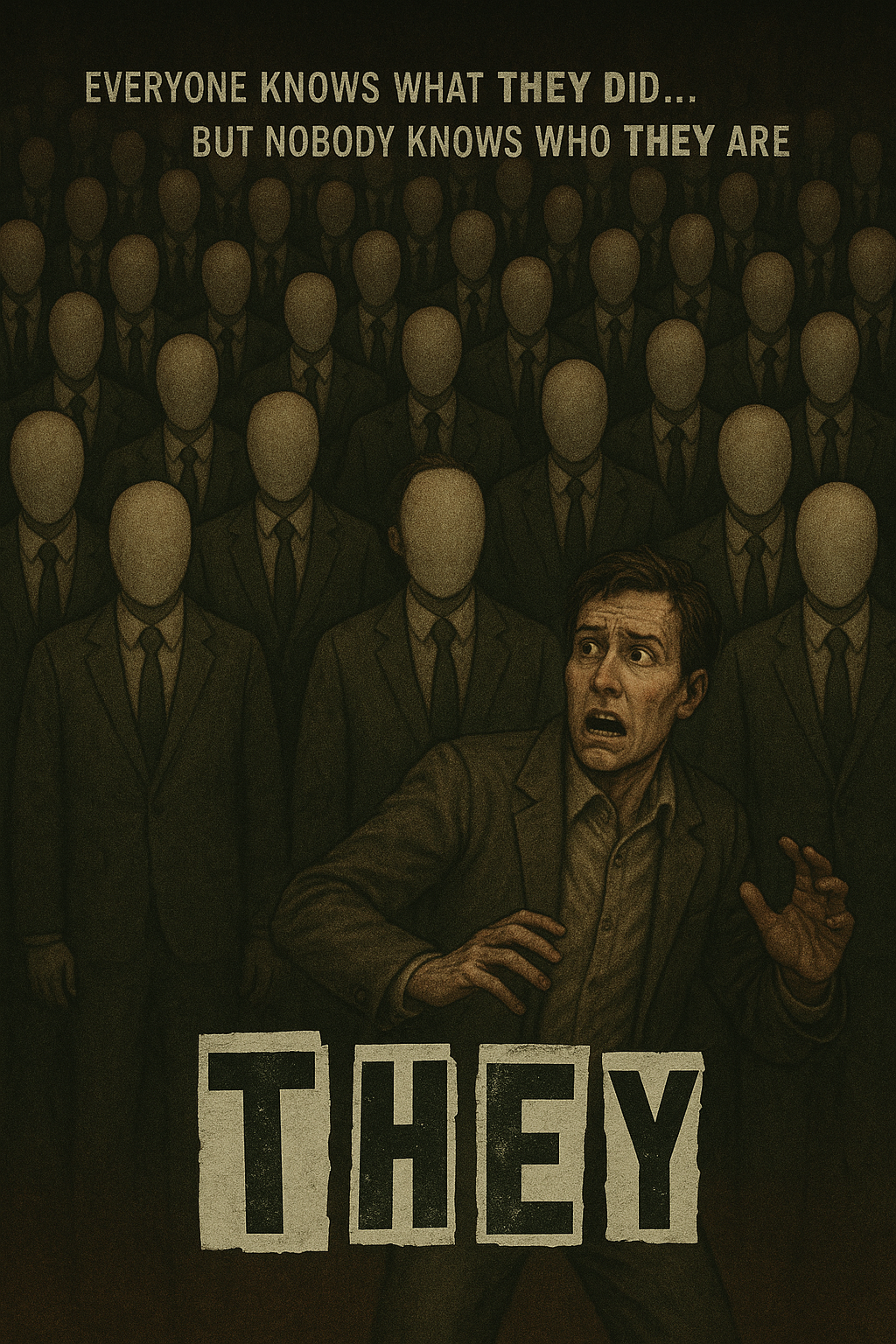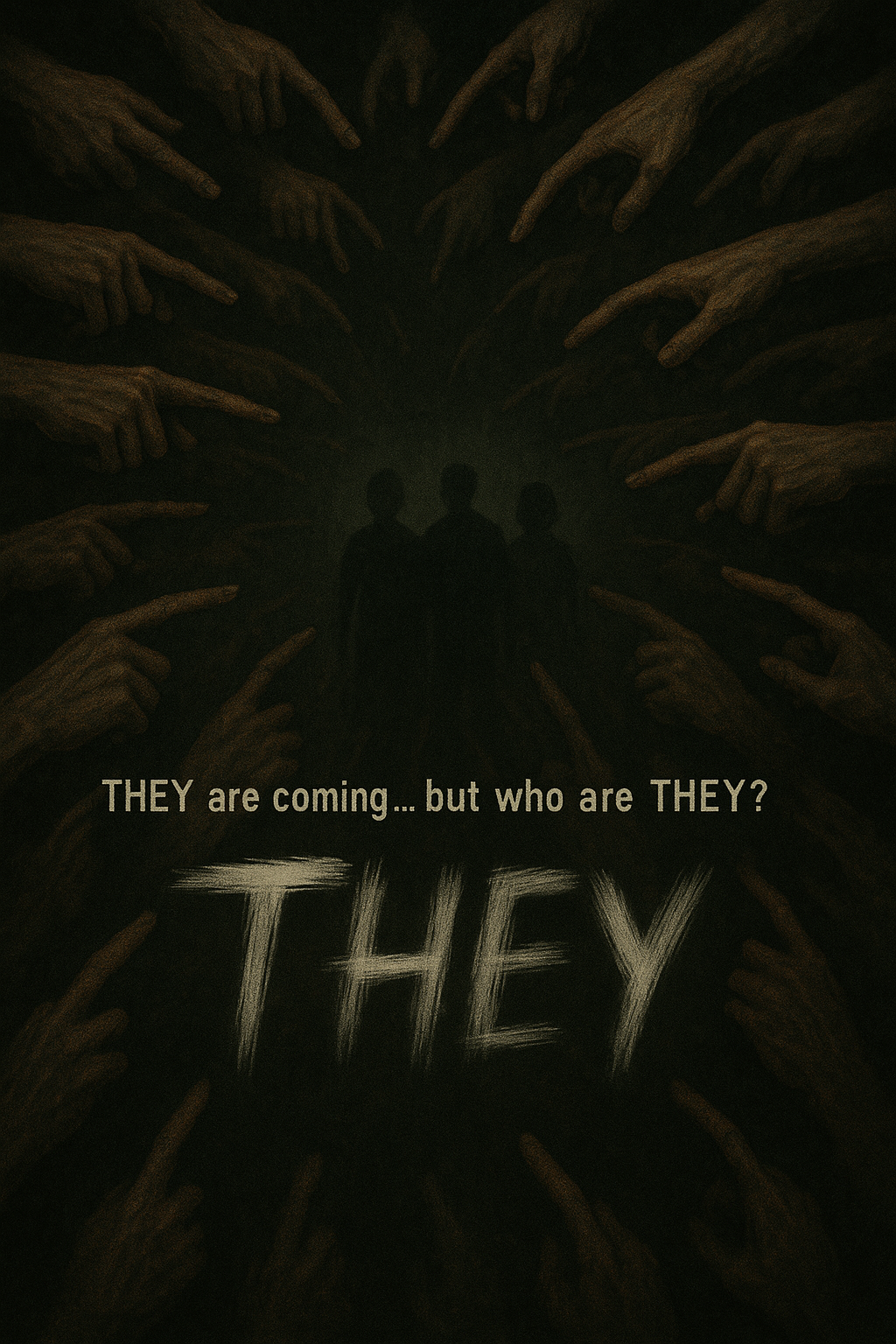How Politicians Weaponize the World’s Vaguest Pronoun

You’re at a dinner party and someone keeps complaining about “them” ruining everything. When you ask “who exactly?” they suddenly develop a fascinating interest in the cheese plate, mumbling something about “you know… them.”
You’re witnessing a master class in one of politics’ oldest tricks: the strategic deployment of the world’s most dangerous pronoun.
Welcome to the “They” trap, where politicians have turned a basic part of speech into a Swiss Army knife of manipulation. It cuts, it stabs, it opens cans of outrage, and somehow it always points away from the person holding it.
When Your Brain Becomes a Mad Lib
Here’s the thing about “they” that makes it political gold: your brain is basically an overeager intern, desperate to fill in the blanks. When someone says, “they’re destroying our way of life,” your mind immediately starts casting directors for this horror movie. Republicans might picture progressive professors, Democrats might see corporate executives, and conspiracy theorists just add another layer to their mental org chart of doom.
It’s like psychological Mad Libs, except instead of generating silly stories about purple elephants, we’re creating enemies out of thin air. Your brain’s pattern recognition system—the same one that helped your ancestors spot tigers in tall grass—gets hijacked by pronouns. Suddenly, you’re scanning for threats that may not even exist, armed with nothing but linguistic breadcrumbs.
This isn’t an accident. It’s the exploitation of social identity theory at its finest. Humans are tribal creatures who naturally sort the world into “us” and “them.” Politicians who master the “they” game aren’t just making speeches; they’re basically running an advanced course in weaponized anthropology.
The Demagogue’s Toolkit: Greatest Hits Across the Spectrum
Every political firebrand, regardless of where they fall on the ideological spectrum, keeps “they” in their arsenal. It’s the AK-47 of political rhetoric—simple, effective, and unfortunately ubiquitous.
Left-wing populists rage against “them”—the corporate overlords, the one percent, the establishment machine grinding down working families. Right-wing populists have their own “them”—the deep state, the elites, the forces trying to replace real Americans. The beauty of this system is that both sides can be simultaneously correct and completely wrong, depending on which “they” you’re talking about.
The escalation ladder is predictable. It starts with “they don’t understand people like us” and climbs to “they want to destroy everything we hold dear.” By the time you reach “they are the enemy within,” you’re basically LARPing a Cold War thriller, complete with phantom villains and imaginary stakes.
And here’s a delicious irony that deserves its own comedy special: some of the loudest voices railing against transgender people’s pronouns—the folks who act like “they/them” pronouns are harbingers of societal collapse—have become absolutely prolific users of “they” and “them” in their political rhetoric. Apparently, pronouns are only dangerous when they’re about personal identity, not when they’re about creating political bogeymen. The same people who can’t handle “they went to the store” suddenly become linguistic poets when it’s “they want to indoctrinate your children.”

The Economics of Ambiguity: Why Vague Pays
Let’s talk money, because that’s what this is really about. “Help us fight them!” is a fundraising goldmine compared to “Help us navigate the complex implications of municipal water treatment regulations!” Specificity doesn’t pay the campaign bills.
Vague enemies are the cryptocurrency of political fundraising—their value exists entirely because people believe in them. You can’t donate to fight the Illuminati, but you can definitely send money to politicians who promise to battle “they” who want to take away your freedoms. It’s brilliant, in a deeply depressing way.
Social media platforms have become the world’s most efficient “they” amplification machines. The algorithm doesn’t care about truth or specificity; it cares about engagement. And nothing drives engagement quite like tribal fury over unnamed threats. Facebook’s recommendation engine doesn’t suggest “Here’s a nuanced policy analysis” —it serves up “They don’t want you to see this!” because that’s what makes people click, share, and rage-scroll into oblivion.
The Grammar Detective Files: Pronoun Forensics
From a purely linguistic standpoint, “they” is performing some impressive gymnastic feats. Grammatically, pronouns are supposed to refer to specific nouns mentioned earlier. But in political speech, “they” becomes a grammatical orphan, floating free from any actual referent like a linguistic ghost.
It creates a “plausible deniability shield.” When challenged, politicians can always claim they meant something else entirely. “Oh, when I said ‘they want to destroy America,’ I was obviously referring to… uh… termites. Yes, termites are a real threat to wooden structures.”
Here’s your handy translation guide for political “they” speak:
- “They want to control you” = “Please don’t fact-check my actual policies”
- “They don’t understand people like us” = “I’m running out of substantive talking points”
- “They hate our way of life” = “I need you angry, not thinking”
- “They’re trying to silence us” = “Someone disagreed with me on Twitter”
The Historical Pronoun Hall of Fame
Every generation gets its mysterious “they.” Sometimes they’re foreign infiltrators, sometimes they’re domestic threats, sometimes they’re just people who want to put fluoride in the water supply. The pronouns change languages, but the song remains depressingly similar.
What’s different now is the speed and scale. Past demagogues had to rely on pamphlets and podiums. Now they have algorithms that can serve personalized “they” content to millions of people simultaneously, each user receiving a customized villain perfectly tailored to their specific fears and prejudices.
The Amplification Machine: How “They” Goes Viral
Social media has turned “they” rhetoric into a 24/7 content factory. Every platform has its own dialect of vague accusation. Twitter excels at rapid-fire “they” deployment, TikTok makes it visual and catchy, and Facebook… well, Facebook makes it your uncle’s problem.
The conspiracy feedback loop is particularly insidious. Someone posts about “they” who don’t want you to know something, others share it because obviously “they” would want to suppress this information, and suddenly you have a self-reinforcing system where the vagueness itself becomes evidence of the conspiracy. It’s like a perpetual motion machine, except instead of generating energy, it creates suspicion.
Bot armies and artificial accounts have weaponized this further, creating artificial waves of “they” content that make grassroots organic outrage and manufactured manipulation nearly indistinguishable. When your enemy is always “they,” it’s conveniently impossible to tell which “they” are real and which are just code running in a server farm somewhere.

The Antidote Lab: Fighting Back
The good news is that “they” rhetoric has an Achilles heel: specificity. The simple question “who?” is like kryptonite to political vagueness. It forces speakers to either name names (and provide evidence) or reveal that they’re shadowboxing with phantoms.
Demanding receipts works too. “They want to destroy America? Cool, show me the memo. What’s their plan? Who signed off on this? Do they have a timeline? A budget? A company retreat where they brainstormed destruction strategies over continental breakfast?”
Teaching media literacy means training people to spot the tells. When someone uses “they” more than three times in a paragraph without identifying who “they” are, you’re probably being sold something. When the enemy is always perfectly evil and the solution is always straightforward, you’re definitely being sold something.
When We Become “They”
We all do this. We all have our own version of “they” who are ruining everything. “They” don’t signal properly on the highway. “They” don’t understand good customer service anymore. “They” are making movies worse these days.
The difference is scale and consequences. When politicians do it, democracy suffers. When we do it, we just sound like people complaining about the weather. But recognizing our own pronoun habits helps us spot when we’re being manipulated by someone else’s.
The Stakes: Why This Actually Matters
Democracy requires specificity. You can’t vote against “they”—it’s not on the ballot. You can’t hold “they” accountable because “they” don’t have names, addresses, or actual policy positions. Real problems require real solutions, not phantom enemies.
When everything becomes about fighting “they,” actual governance gets lost in the pronoun wars. Infrastructure crumbles while we battle shadows. Healthcare systems strain while we argue about unnamed threats. Climate changes while we point fingers at mysterious forces.
The cost of constantly fighting ghosts is that we stop fighting real problems with real solutions. It’s political theatre that’s replaced actual politics, and we’re all paying for front-row seats to watch democracy perform its own demolition.
Reclaiming Our Pronouns: A Call to Action
The solution isn’t complicated, though it does require something that’s become surprisingly rare: insisting on specificity. When politicians say “they,” we respond with “who?” When they make vague accusations, we demand evidence. When they promise to fight unnamed enemies, we ask for their battle plan.
We can also model better behaviour in our own conversations. Instead of “they say” or “they think,” we can cite sources. Instead of “they’re ruining everything,” we can identify specific problems and potential solutions.
Make specificity sexy again. Demand names, dates, and details. Reward politicians who speak in concrete terms about actual issues. Punish those who traffic in pronoun smoke and mirrors.
Because here’s the thing about “they”: the moment we start asking “who,” the whole house of cards collapses. Mystery enemies can’t survive in broad daylight, and democracy works much better when we’re fighting real battles instead of tilting at grammatical windmills.
The real “they” we should be worried about? Anyone who wants us to stop asking questions. And yes, I can name names—they’re the ones whose speeches sound like paranoid Mad Libs, whose fundraising emails read like conspiracy theories, and whose entire political strategy depends on keeping us afraid of shadows.
Time to turn on the lights.


